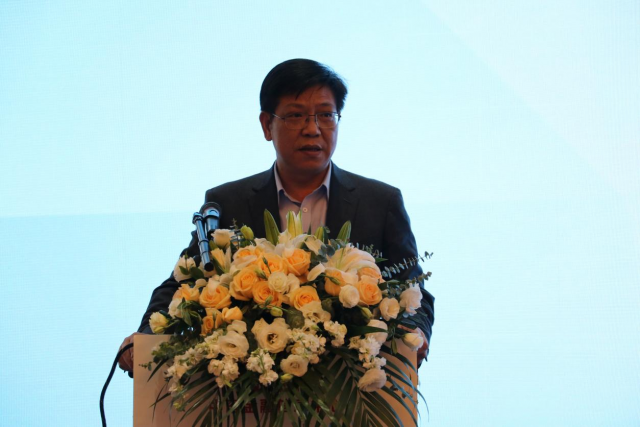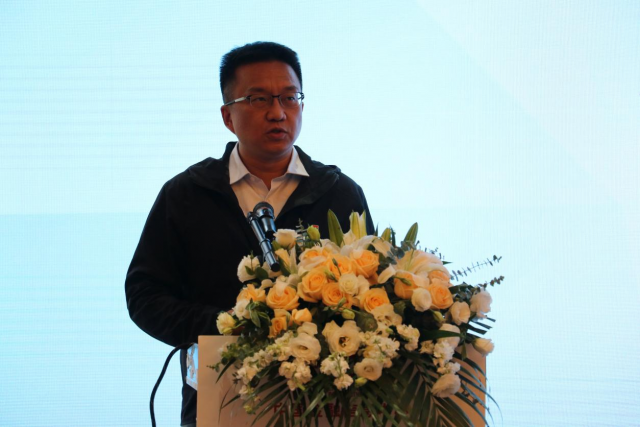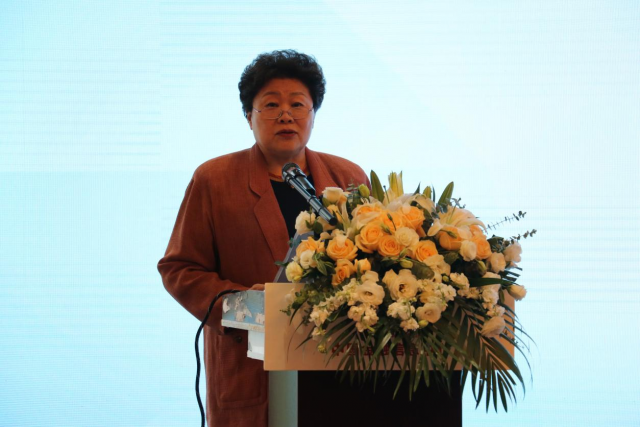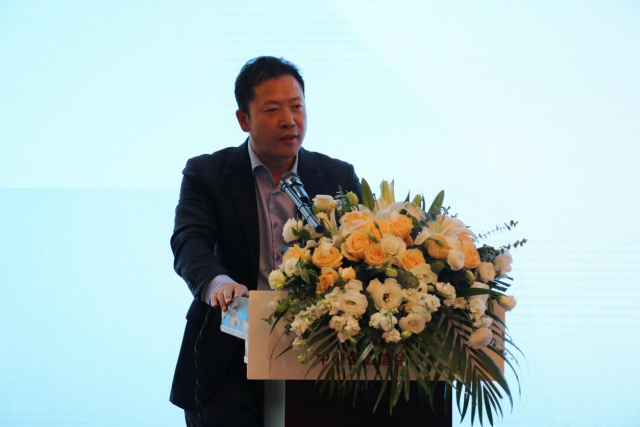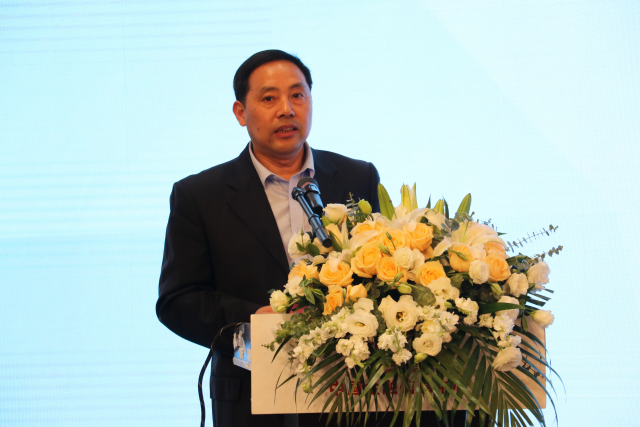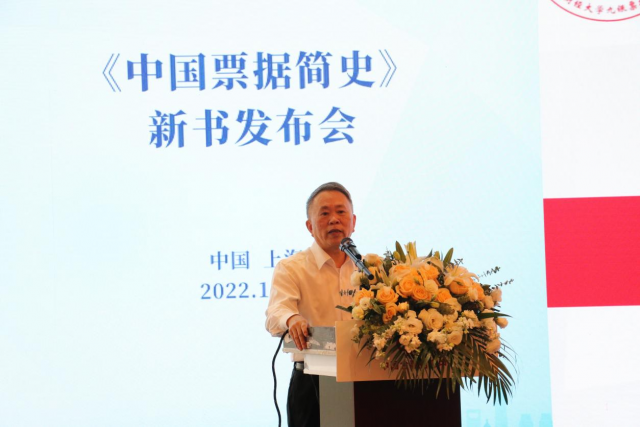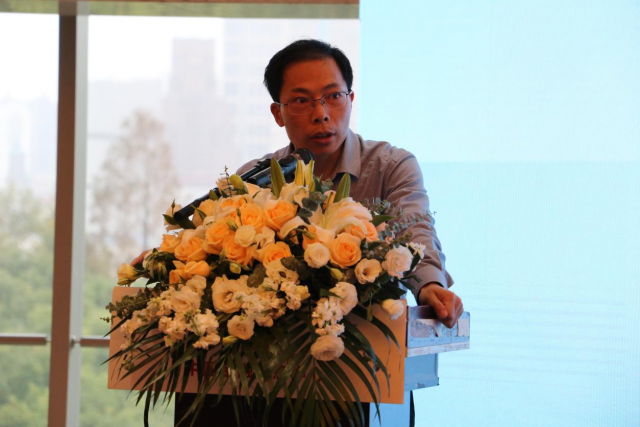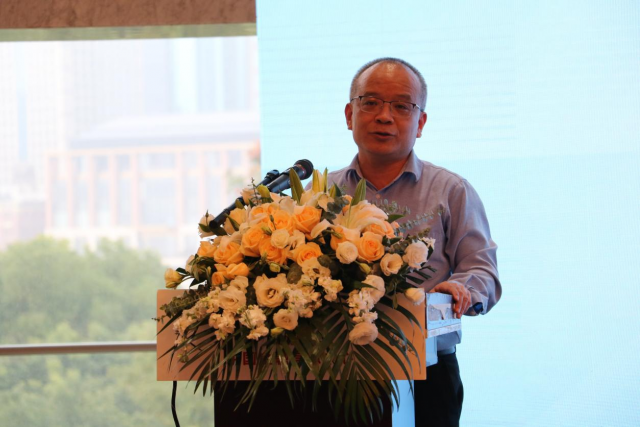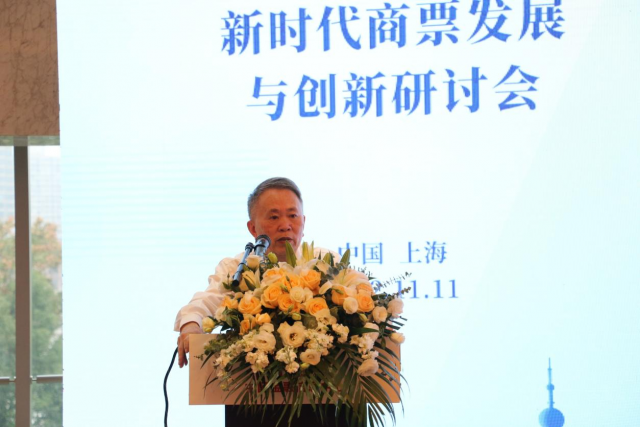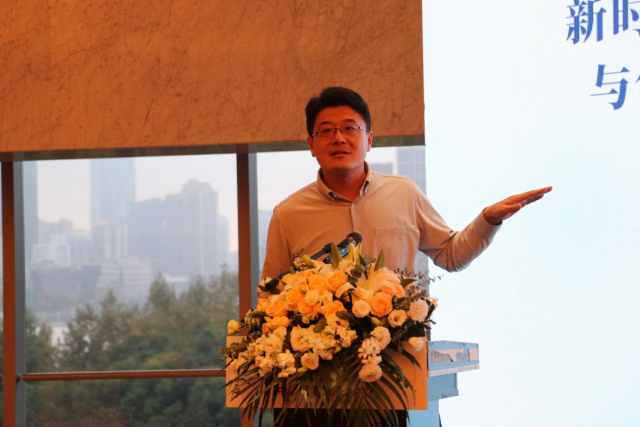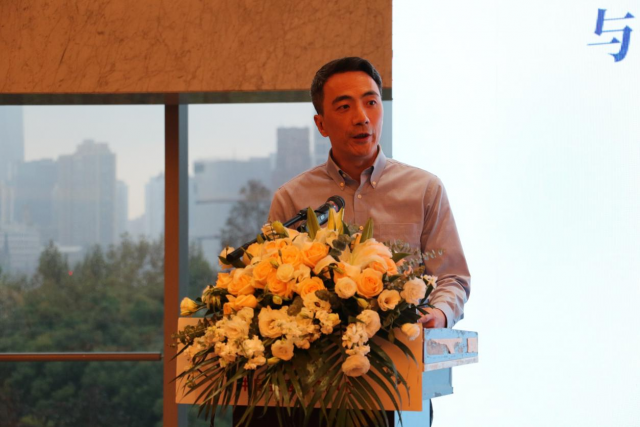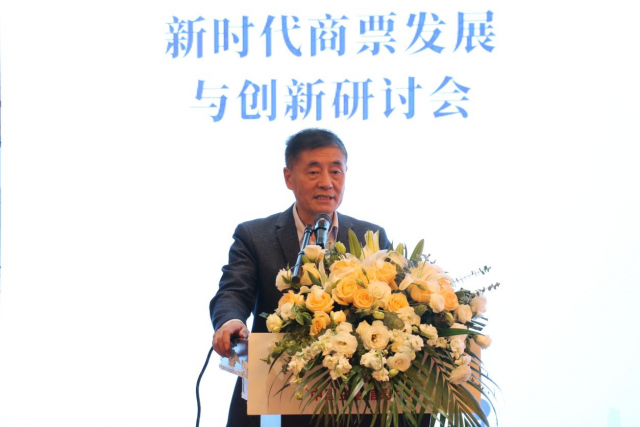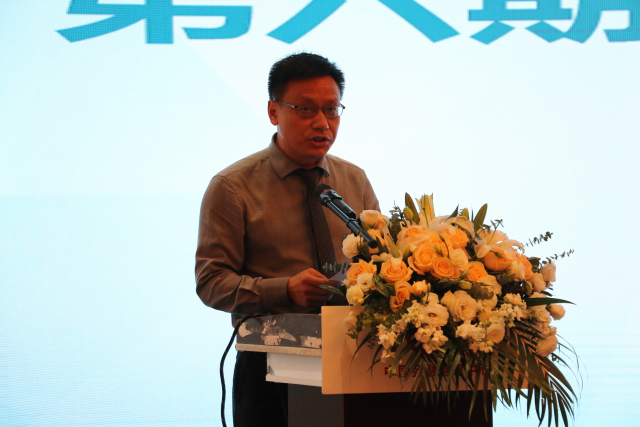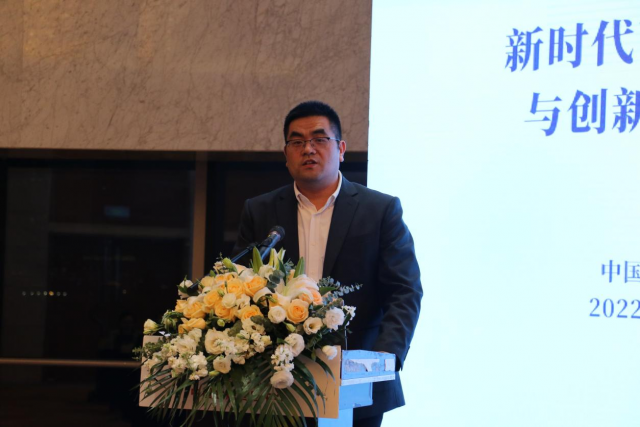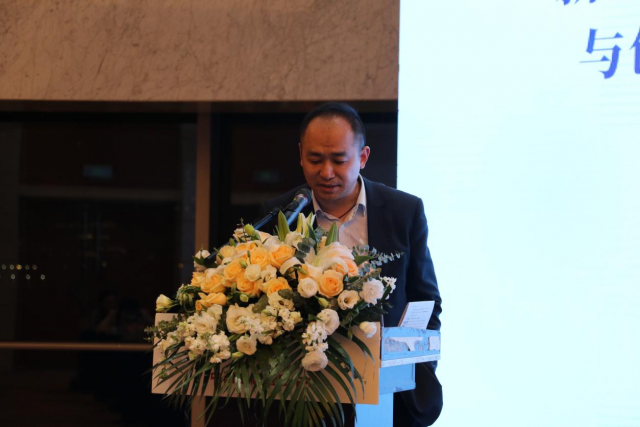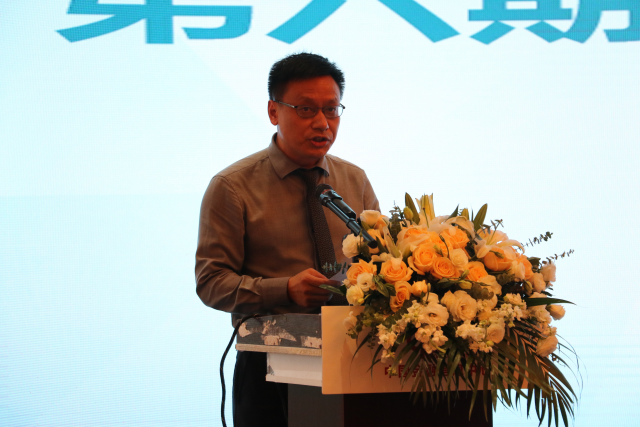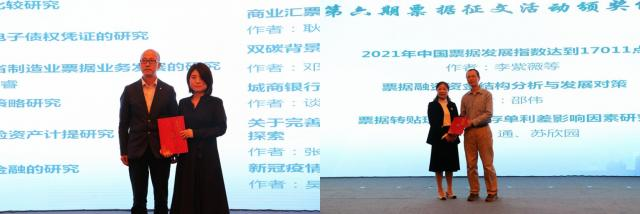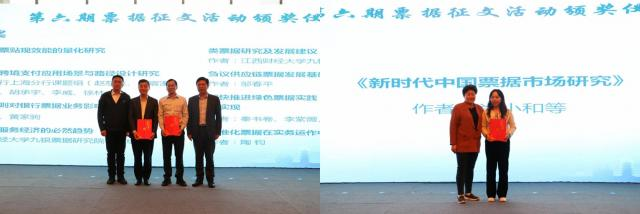| Seminar on the Development and Innovation of Commercial Tickets in the New Era and the Launching Ceremony of A Brief History of Chinese Bills |
| 发布时间:2022-11-16 20:40:38 浏览次数: |
|
On November 11, the Seminar on the Development and Innovation of Commercial Tickets in the New Era and the Launching Ceremony of A Brief History of Chinese Notes, sponsored by the China Commercial Tickets Research Center of the Jiuyin Bill Research Institute of Jiangxi University of Finance and Economics and undertaken by Jiangxi University of Finance and Economics and Jiujiang Bank Co., Ltd., was held in the China Financial Information Center. Guests attending the meeting included Yuan Honglin, Vice President of Jiangxi University of Finance and Economics, Xiao Jing, President of Jiujiang Bank Co., Ltd., Zhou Rongfang, Chief Supervisor of Shanghai Bill Exchange, Zhan Xiangyang, former Research Director of ICBC and consultant of Jiuyin Bill Research Institute of Jiangxi University of Finance and Economics, Ye Guobiao, Secretary and Chairman of the Party Committee of Shanghai Securities News, China Financial Information Center, and Chairman of Shanghai Oil and Gas Trading Center, Xiao Xiaohe, Executive Dean of the Jiuyin Bill Research Institute of Jiangxi University of Finance and Economics, Yang Mingqi, Director of the Financial Market Department of the Shanghai Headquarters of the People's Bank of China, Wan Liming, Professor of the Marxist School of Tongji University, Yan Yongjia, General Manager of the Research and Planning Department of Shanghai Bill Exchange, Zhang Dichen, an expert in the bill business department of Industrial and Commercial Bank of China, Zhao Cila, a senior researcher in the Jiuyin Bill Research Institute of Jiangcai, Zhou Kunping, a former senior expert in the Development Research Department of Bank of Communications Dong Yuhua, Director of the Shanghai Branch of the Audit Bureau of the Agricultural Bank of China, and experts and scholars from universities, bill practitioners from commercial banks, securities companies, brokerage companies, and media friends from newspapers and magazines.
Yuan Honglin introduced the basic situation, school running characteristics of Jiangxi University of Finance and Economics and the work of Jiangcai Jiuyin Bill Research Institute. He pointed out that commercial paper is a short-term financial instrument with multiple functions such as payment and settlement, credit and financing, and its characteristics determine its natural advantages in the application of supply chain finance. With the online supply chain bill platform, commercial bill information disclosure platform and a new generation of bill trading system of Shanghai Ticket Exchange, the bill market infrastructure has been continuously improved, bringing new opportunities for the development of commercial bills. In this context, this seminar is held at the right time. He wishes the conference a complete success and the Institute a better future!
Xiao Jing pointed out that in recent years, Jiujiang Bank has firmly committed to service supply side reform and high-quality development of the supply chain, practiced the market positioning of industrial chain financial bank, managed and promoted the bank's first industry, characteristic industry and focused on supporting industrial development. Jiujiang Bank has made great strides in exploring the bill field, vigorously promoted the use of bills in the supply chain, deeply innovated the bill credit enhancement business, and adopted a series of positive measures to promote the implementation of business. He thought that this seminar had carried out in-depth discussions on the current hot issues of commercial tickets, complied with the new trend of the development of the bill market, and congratulated the successful holding of this seminar. The Brief History of Chinese Notes was a best seller, and the winners of the essay solicitation continued to make great efforts to create better achievements, so that the Institute would become better and better!
Zhan Xiangyang celebrated the publication of the Brief History of Chinese Notes and the sixth anniversary of the founding of the Academy. She believes that the current economic situation has the following characteristics: first, the economy has recovered; Second, the slow growth of residents' income has a negative impact on consumption; Third, although the unemployment rate has improved, it is still at a high level, and the employment situation is still grim; Fourth, consumer prices dragged up. Production prices drag downward. On the whole, production growth is faster than consumption. Although affected by negative factors at home and abroad, the future economic trend is still grim, but on the positive side, the fundamentals of China's economy remain unchanged, the policy role of coping with insufficient domestic demand and shocks is emerging, financial supply is sufficient, and economic activity increases with investment growth. From the data of previous quarters, the growth rate of bill financing is increasing, and the recovery of small, medium and micro enterprises is slow, leaving room for future growth.
Ye Guobiao pointed out that bills are important financial credit instruments, integrating exchange, payment, financing, trading and other functions, and have played a unique role in reducing the financing costs of SMEs, serving the real economy, and ensuring the stability of the industrial chain supply chain. In particular, the establishment of Shanghai Bill Exchange in December 2016 has brought profound changes to the bill market: first, from decentralized separatism to national unity; second, from traditional paper tickets to the era of electronic tickets; third, from chaos and disorder, frequent risks to stability, safety and order. He said that Jiangxi University of Finance and Economics and Jiujiang Bank had a vision. They had jointly built a research institute, focused on the bill industry, and worked hard. Over the past six years, they had published 9 monographs and more than 300 papers, with fruitful results and outstanding influence.
The seminar was divided into three parts. The first part was the press conference of the new book A Brief History of China's Bills, the second part was the publication of the sixth essay evaluation results and the award ceremony of the Academy, and the third part was the sharing of experts on the development and innovation of commercial tickets in the new era, presided over by Professor Gui Hefa, Dean of the School of Finance of Jiangxi University of Finance and Economics and Dean of the Jiuyin Bill Research Institute of Jiangxi University of Finance and Economics.
At the press conference of the new book, Xiao Xiaohe pointed out that the Brief History of Chinese Bills focuses on bills, is rigorous in logic, rich in stories, and has a strong summary. It is divided into three chapters, namely, bills in ancient China and the late Qing Dynasty, bills in the Republic of China, and bills since the founding of New China. The first chapter is written in the order of historical dynasties, and the second and third chapters are divided into stages according to the development characteristics of the bill market, At the end of the third chapter, there is a special chapter for thinking. The Brief History of China's Bills can be used by bill regulators, management and practitioners of financial institutions' bill lines, corporate finance personnel, professional researchers, teachers and students of colleges and universities and other readers interested in bills.
Ms. Zhou Rongfang said in her book review that the Brief History of China's Bills perfectly combined the operation and theory of bill business, profession and interest, inheritance and innovation, and presented the development context of the bill market in the form of time and section. A Brief History of China's Bills not only summarizes the experience and lessons of bill development over thousands of years, but also ponders and expounds the future development of China's bill market, which is worth reading. The book uses nearly two chapters to describe the bill market after the establishment of the Exchange. In her opinion, the standardization of the bill market, the ability to prevent and control risks, and the ecology of the bill market have been greatly improved since the establishment of the Exchange. Its impact on the bill market is mainly reflected in the following aspects: first, entering the new era of electronic bills in an all-round way, second, building a three-dimensional risk management and control system, and third, optimizing the ecology of the bill market, Fourth, fully rely on science and technology to empower. She believes that, with the joint efforts of the vast number of colleagues in the bill market and everyone present, the development of the bill market will surely usher in a brighter future!
Wan Liming's book review pointed out that, as an ancient and vital financial instrument, bills have undergone changes with the development of economy, credit and finance, and their functions have been constantly enriched, developed and improved. Whether in history or today, bills have played an irreplaceable role. History is the best textbook. A Brief History of China's Bills is based on history. From ancient times to the present, it combines vertically and horizontally. At present, it is a book that systematically combs and studies the history of bills. The book takes time as a longitudinal clue, and narrates on the basis of the historical facts of bills. From the earliest prototype of bills in the Zhou Dynasty to the current green bills, the book is connected from ancient to modern times, with a combination of historical theories and rich historical materials, which reflects the characteristics of historical connectivity. The content is comprehensive and profound, with detailed information and emphasis on stories. The book is not only easy to understand in language, but also academic, which can provide a reference for the future development of China's bill market.
Zeng Dapeng, a professor at the School of Economic Law of East China University of Political Science and Law, said that the book A Brief History of Chinese Bills was simple, but not simple. The book began with a survey of bills in the Zhou, Tang, Song, Ming and Qing dynasties, which enhanced the sense of seriousness of the history of bill development and enriched and enriched the overall historical image of bills. The book is fully committed to sorting out the historical context of the development of domestic bills in China, and does not involve foreign bills. It analyzes the development of the bill market before and after the establishment of the Shanghai Bill Exchange in a large space, and sets up the last chapter, A Brief History of Bills, to analyze the evolution of bill functions and their role in serving and promoting the economy and finance, summarize the shortcomings and experience of bill development, and look forward to China's future bill market, The possible new direction of bill development is proposed. Compared with Bill History, the first book describing the development history of bills in China, Brief History of Chinese Bills is also a product of more intensive research on the content and level of bills.
Professor Peng Yulute, deputy dean of the School of Finance of Jiangxi University of Finance and Economics, pointed out in his book review that A Brief History of China's Bills comprehensively combed the development context of China's bills. The contents were closely linked and progressive, showing the development history of the new China's bill market from multiple perspectives and dimensions. The book deeply analyzes the development law of China's bills, pays attention to summarizing the development law of China's bills and the economic and scientific and technological factors behind it when writing, analyzes the evolution of bill functions on the basis of comprehensively describing the development context of China's bills and summarizing the development of China's bills, distills the experience and lessons of bill development over thousands of years, makes a systematic plan for the future development of China's bill market, and puts forward the future development direction. He believed that, standing at a new starting point, shouldering a new mission, and striving to write a new chapter of high-quality development, the Brief History of Chinese Bills could help readers better learn about bills, deeply understand their functions, and further promote the bill market to serve the real economy more effectively.
In the expert sharing link, Xiao Xiaohe shared activating the credit function of commercial bills and serving the high-quality economic development in the new era and pointed out that bills are the carrier of credit and credit is the foundation of bills. Commercial bills carry commercial credit and are important payment and financing tools for enterprises. The development of commercial bill market is conducive to improving the commercial credit environment in China and boosting high-quality economic development. He proposed to promote high-quality economic development, promote the development of supply chain finance, accelerate the development of small and medium-sized enterprises, vigorously promote the development of green economy, promote the notes of accounts receivable, promote the notes of accounts payable, reduce the proportion of working capital loans, improve business management, accelerate the process of ticket digitization, strengthen credit risk control and other development suggestions.
Yan Yongjia said that commercial paper is a credit tool based on commercial credit, which has the characteristics of clear rights and obligations, scheduled payment, transferable discount, etc. It should mobilize the enthusiasm of all parties, establish a benign mechanism to effectively promote commercial paper, and the supply chain bill platform is a good carrier. The core of commercial bill development lies in credit. We should give full play to the role of commercial bill information disclosure mechanism, promote the payment and performance of acceptors, and enhance the acceptance confidence of enterprises. At the same time, we should also strengthen the publicity and training of commercial ticket business and further popularize business knowledge. In the past few years, the commercial ticket business has grown steadily and slowed down, and the development of the commercial ticket market is facing challenges: on the one hand, affected by a few low credit enterprises before, the acceptance of commercial tickets by enterprises has declined, and the liquidity of commercial tickets has decreased; On the other hand, the development of similar notes also has some impact on the commercial bill market. He believed that the development of commercial ticket market in the future needs the joint efforts of all parties, starting from strengthening positive publicity, optimizing functional services, promoting and improving policies and other aspects.
Zhang Dichen pointed out in his speech that the current commercial ticket market has entered a stage of steady development, and the requirements for the disclosure of commercial ticket information are increasingly standardized. The supply chain bill platform promotes the transformation of accounts receivable to commercial tickets from the source. The new generation of bill business system supports the differentiation of commercial tickets, and the ecological environment of the commercial ticket market is increasingly mature. However, the current development of China's commercial bill market is faced with problems such as the issuing willingness of the front end needs to be further improved, the back-end circulation and financing capacity needs to be further strengthened, and the commercial bill rating constraint mechanism needs to be further improved. For the development of commercial paper business, he put forward the following suggestions: First, promote the promotion and application of supply chain bills by standardizing the accounts receivable financing market, and actively create a good commercial paper application environment; Second, accelerate the establishment of commercial credit and bill credit system, and improve the mechanism of commercial bill information disclosure; The third is to effectively strengthen the financing capacity of commercial bills, improve the service capacity of discount market, broaden the direct financing path of commercial bills, and expand the refinancing channels of discounted commercial bills.
Zhao Cila said in his speech that the National Bureau of Statistics showed that the growth rate of enterprise accounts receivable continued to be higher than the growth rate of operating income, the frozen disease of enterprise working capital was becoming more and more serious, and the pressure on small, medium and micro enterprises to hold funds at the back end of capital flow was increasing. The central bank will shorten the time limit of the electric ticket to six months, and the new system of the ticket exchange will realize the split payment, which will effectively improve the function of the electric ticket payment. To implement the central policy of increasing the support for bill financing of private enterprises, simplifying the discount business process, and improving the efficiency of discount financing. It requires the innovation of policies and systems. The financial infrastructure management function of Shanghai Stock Exchange should be brought into play, and the main reporting bank system of bill business should be established; Commercial banks should vigorously develop electronic commercial bill bank guarantee business and electronic commercial bill guarantee and discount active credit business to facilitate the payment circulation and discount financing of electronic commercial bills.
Qin Shujuan, Secretary General of the Research Institute and General Manager of the Bill Center of Jiujiang Bank, pointed out in his speech that at present, enterprise accounts receivable continue to rise, while undiscounted bills decline. Accounts receivable are the financing cause of supply chain enterprises, and bills such as greedy snakes can reduce the total amount of accounts receivable. On the one hand, the proportion of commercial bills in the total amount of bills is still low, and the proportion of commercial bill discount is lower than that of acceptance. On the other hand, the growth rate of commercial bill discount is higher than that of silver bills. The value of commercial bills will be gradually explored, including the opportunities brought by the new method of controlling silver bills, the advantages of commercial bills in the supply chain, such as flexible transaction structure and low asset cost, and the opportunities brought by the digitalization of industry and finance and the transformation of commercial banks' corporate business. The key bill guarantee business of commercial bill innovation, the application of bills in the industry supply chain, and the thinking of transaction banks, investment banks, and full product management. Therefore, the bank led supply chain finance will be the real key to solve the enterprise financing on the industrial chain, and platform+credit enhancement+notes of accounts receivable will be the sharp knife of chain supply chain financing!
Zhao Qing, deputy general manager of the bill center of Industrial Bank's inter-bank finance department, pointed out in a speech that, for enterprises, commercial paper conforms to the essence of the supply chain, has lower financing costs, can meet the needs of enterprise financial planning, and has a clearer legal relationship. The commercial paper credit system has gradually improved. He analyzed the impact of Ba III on the capital occupation of bill business and pointed out that the time has come to develop commercial acceptance bills. Zhao Qing, Deputy General Manager, analyzed the problems faced by the development of the commercial bill market from the aspects of liquidity and recourse, and proposed to further strengthen the publicity of bills serving the real economy, unblock the pricing mechanism of the main body, correctly reflect the market value of credit subjects at different levels, explore the selective waiver of recourse to discounters and their predecessors, and carry out the commercial bill credit enhancement business in compliance with regulations.
Wang Jian, Assistant General Manager of Financial Market Department of Shanghai Branch of Bank of Jiangsu, pointed out in his speech that commercial acceptance bill is essentially the medium of commercial credit circulation and credit transmission, and the weak commercial credit foundation is the main sticking point of restricting the credit transmission function of commercial acceptance bill. For a long time, China's commercial ticket market has had problems such as obvious imbalance of market structure, absence of basic system, etc., and the development foundation of commercial ticket is unstable. He believes that the establishment and improvement of the commercial ticket information disclosure system is conducive to promoting the virtuous circle of commercial credit system and commercial ticket market development, strengthening market credit constraints and high-quality development of commercial ticket market. For commercial ticket business innovation, he proposed to accumulate credit databases and build credit databases for small and medium-sized enterprises; Sharing credit information and building a complete commercial credit system; Supporting the disposal mechanism and realizing the dual constraints of market and institutionalization.
At the meeting, the selection results of the sixth bill solicitation activity of Jiuyin Bill Research Institute of Jiangxi University of Finance and Economics, the editorial department of Journal of Shanghai Lixin Institute of Accounting and Finance, and the magazine office of Contemporary Finance and Economics were also announced, and the award ceremony was held. Qin Shujuan, Secretary General of Jiuyin Bill Research Institute of Jiangxi University of Finance and Economics, read out the list of winners. Zhan Xiangyang, former research director of ICBC and consultant of Jiangcai Jiuyin Bill Research Institute, Zhou Rongfang, chief supervisor of Shanghai Bill Exchange, Yuan Honglin, vice president of Jiangxi University of Finance and Economics, Xiao Jing, president of Jiujiang Bank Co., Ltd., and Li Husheng, vice director of the academic journal center of the Journal of Shanghai Lixin Institute of Accounting and Finance were the special prize, the first prize The second and third prize winners will be awarded certificates. On the occasion of the sixth anniversary of the founding of Jiangcai Jiuyin Bill Research Institute, this meeting is a review of the development process and history of commercial bills in the new era and on the new journey, as well as a multi-dimensional exploration of the future development of commercial bills. The meeting held that the key to the development of commercial paper lies in the development of commercial paper credit. Commercial bill credit develops with the development of economy and finance. The speed, width and depth of economic and financial development determine the degree of commercial bill credit development. Their interdependence and adaptability have positive significance for the development of social, economic and financial credit. The development of commercial ticket credit is a highly developed product of social development, and commercial ticket is a sign of highly developed credit. And the commercial bill credit informatization, digitalization, intellectualization and marketization are inevitable for the high development of credit. At the same time, commercial bill credit is also the only way to develop social credit. Therefore, we believe that the development of commercial paper is closely related to the development of commercial paper credit and the development of social, economic and financial credit. Therefore, commercial tickets, as a highly product of social credit, will inevitably present the development trend of informatization, digitalization, intelligence and marketization. |
 |
All right reserved @ 2013 Jiangxi university of
finance and economics finance institure China Postal Code: 330013 E-mail: jxcdjrxy@jxufe.edu.cn Tel:0791-83816792 |
|

